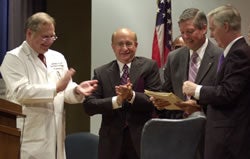Governor signs bill to fund ECU cardiovascular center
GREENVILLE, N.C. (Aug. 5, 2004) — Gov. Mike Easley today signed legislation that will fund a $60 million cardiovascular research center at East Carolina University.
As Easley used numerous pens to sign the document, Dr. W. Randolph Chitwood, the heart surgeon who will lead the research center, passed out the pens to legislators, university leaders and others who helped secure the funding.

From left, Dr. W. Randolph Chitwood, director of the Eastern Carolina Cardiovascular Institute and Dr. Michael Lewis, ECU vice chancellor for health sciences, applaud as Dr. Steve Ballard, ECU chancellor, receives the signed bill from Gov. Mike Easley tha
“The sun shines bright on eastern Carolina today,” said Chitwood, who is also a professor of surgery and chief of cardiothoracic and vascular surgery at the Brody School of Medicine at East Carolina University and senior associate vice chancellor for health sciences at ECU. “(The center) means better education and clinical care. We want to find ways to improve the prevention of disease as well as the treatment of disease. It’s a new day in eastern North Carolina for the health of our citizens.”
The cardiovascular institute is expected to create more than 500 new jobs with an immediate economic impact of $300 million. Long-term impact is estimated to be more than $34 million a year.
North Carolina has one of the highest rates of advanced cardiovascular disease in the nation, accounting for one in four deaths.
“This means a lot to eastern North Carolina,” Easley said. “First it’s important to economic development. It will help research and it will create jobs. Second, it gives us a treatment and research facility. The greatest benefit is that it will keep people healthy. We have to make our people healthier.”
House Bill 1264 will provide $30 million this year and another $30 million next year to fund the construction of the 180,000-square-foot cardiovascular clinical research, outpatient programs and education center and a 40,000-square-foot addition to the Warren Life Sciences Building for a cardiovascular basic science research center. The Warren Building houses the medical school’s robotic surgery training program. Chitwood is a pioneer in the use of robot-assisted heart surgery, and physicians from around the world come to Greenville to learn his techniques.
In addition to robotic heart surgery, the center will also study ways to prevent heart and blood vessel disease, including stroke, educate the public about the dangers of cardiovascular disease and treat those with ailing hearts and vascular systems.
The ECU center will complement a new $170 million cardiovascular bed tower planned at Pitt County Memorial Hospital, the teaching hospital of the Brody School of Medicine. That 120-bed facility will unite the hospital’s cardiovascular inpatient and outpatient services under one roof and add 12 new beds for cardiovascular patients.
Design work on PCMH’s tower is underway, and plans for the ECU center are in the early stages.
Dave McRae, chief executive officer of UHS, said the new institute will connect cardiovascular services throughout the region in a way that will serve as a model for other medical services as well as predominantly rural areas.
“This institute will be an important step in fulfilling our basic mission to improve the health of all of the residents of eastern North Carolina,” he said. “We will do that by not only creating this resource in Greenville, but by linking with and supporting the work of hospitals and physicians involved in a daily battle with this disease in our region.”
Chitwood mapped out his vision for the institute last year. That plan concentrates all the specialists involved in the care of heart and vascular patients — university and private practice cardiologists, cardiothoracic and vascular surgeons, radiologists, pediatric heart specialists, nurses and therapists — into a single entity focused on heart and blood vessel disease and congenital heart disease.